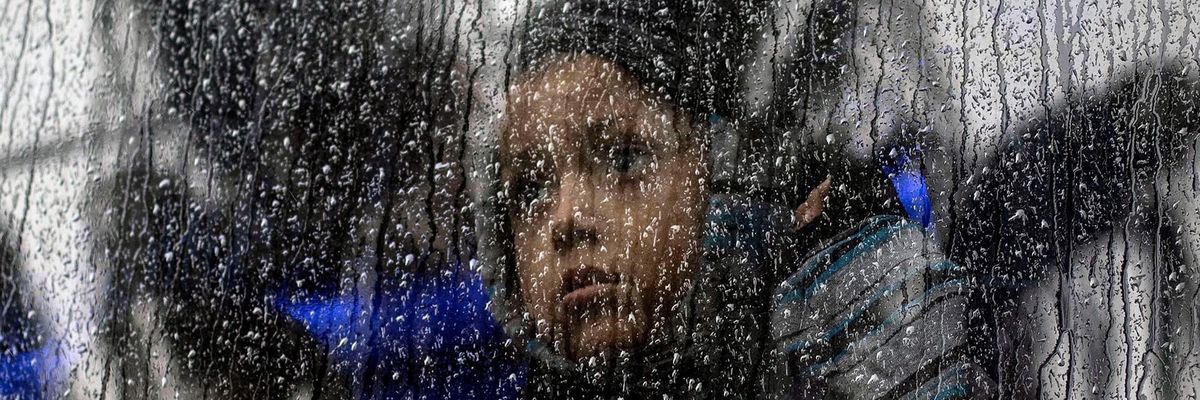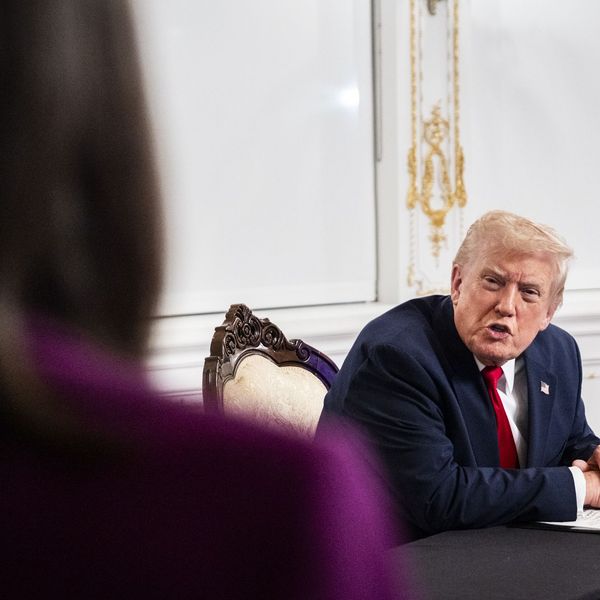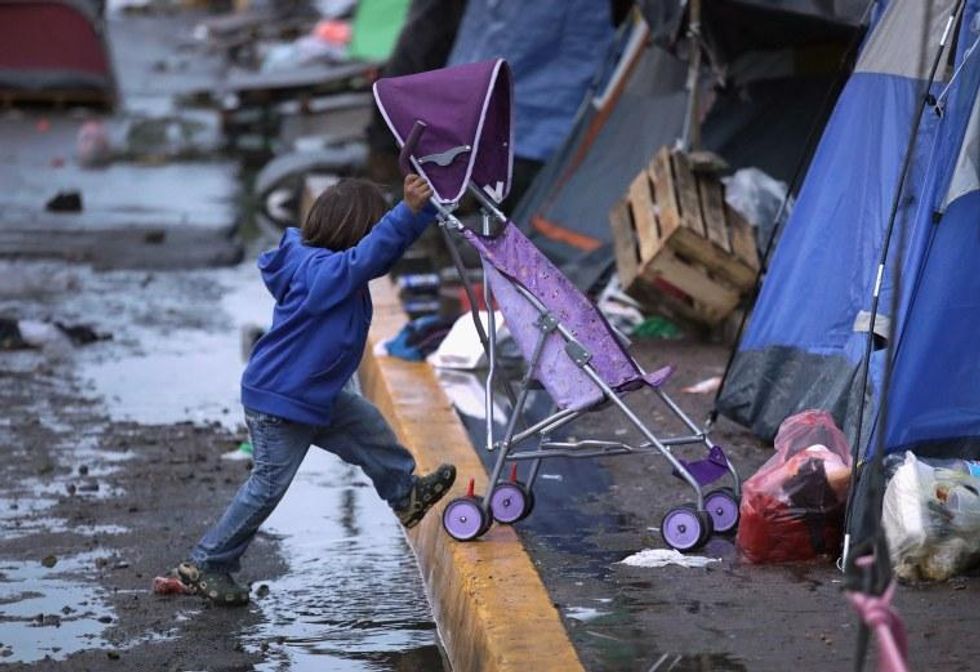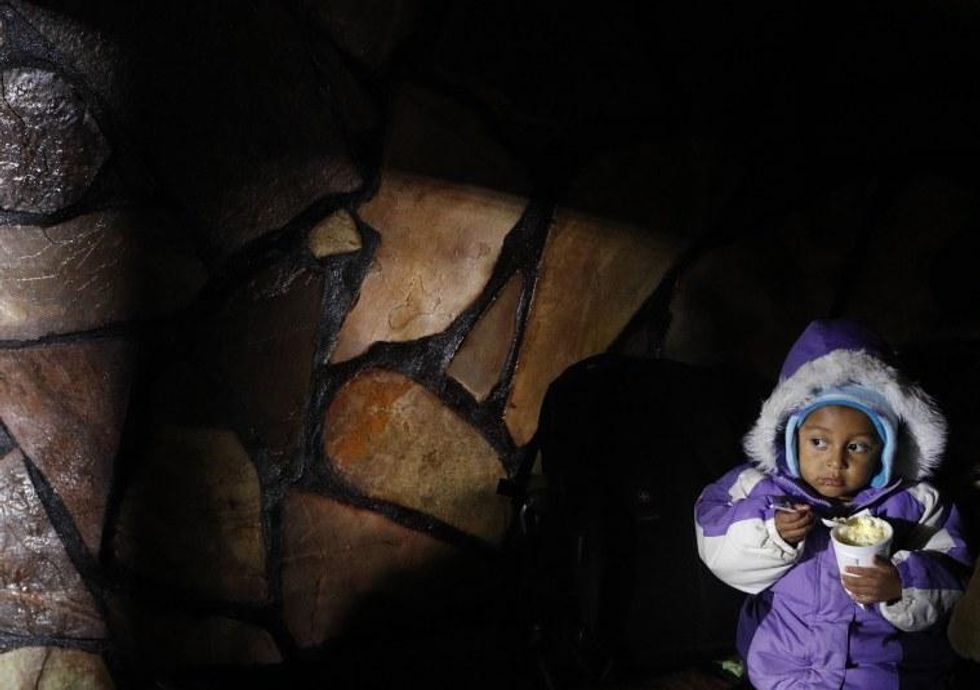
A Central American girl travelling in a migrants' caravan, rides a bus outside a temporary shelter in eastern Tijuana, Baja California state, Mexico on December 6, 2018. (Photo: Guillermo Arias / AFP - Getty Images)
Trump's Caravan Problem Isn't Which People Are Coming, But What Kind of Country America Will Choose to Be
The plight of asylum seekers in Tijuana reflects the dying promise of this country as a land of refuge from suffering
A bleak irony is emerging in Tijuana's border zone. For all the raging conservative rhetoric about how Central American migrants are lawbreakers who refuse to just "get in line" and enter the "legal" way, the asylum seekers are actually "getting in line" -- or what passes for a line -- by forming an ad hoc queue that Mexican authorities have improvised to maintain some social order.
Every day, migrants line up to be "processed" with a black number scrawled onto their arms -- an informal label used to secure a "spot" on a theoretical waiting list. Yet, as they wait indefinitely for their number to be called, the basic institutions of due process they hope to invoke are disintegrating in a dysfunctional, backlogged immigration court system.
The White House remains hell bent on keeping them out, however, and the plan appears to be to warehouse asylum seekers in Mexico with the underlying aim of discouraging them from trying to cross at all. So a ragged encampment in Tijuana is slowly sinking into chaos as heavily militarized American border authorities block and repel refugees.
The situation is not "immigration enforcement" in any meaningful sense. Instead, it's a reprise of historical pattern of exclusion, displacement and oppression that has always surrounded the nation's southern boundary -- lines of class, race, gender and culture are deliberately drawn to police a social gateway to the country. And to President Trump, these refugees are the wrong kind of people.
Migrant rights advocates on the other side of the border see a side of crisis that Trump seems incapable understanding: They are desperate families fleeing for safety, they are survivors, they are refugees of social catastrophe.
Whether or not the migrants are ultimately admitted, the crisis at the border is not about who is coming, but who we are; their transgression of an arbitrarily-drawn border is dwarfed by the savagery the U.S. government commits in the name of "security." The plight of asylum seekers reflects the flagging promise of America as a land of refuge; their suffering is our own self-sabotage.
According to Trump, though, the migrant caravans moving toward the U.S.-Mexico border represent an unstoppable invasion of social parasites and criminals. But migrant rights advocates on the other side of the border see a side of crisis that Trump seems incapable understanding: They are desperate families fleeing for safety, they are survivors, they are refugees of social catastrophe. And Trump is right that they're unstoppable, but only because they are following international law and the basic moral principles enshrined in the constitution.
Although Mexican authorities are providing limited emergency aid, the skeletal safety net is already strained to a breaking point, with growing crowds forced into an Obama-era stopgap system known as "metering," which amounts to an indefinite limbo period of legal purgatory. Yet rights advocates say this is a crisis of Trump's own making.
Michelle Brane, an advocate with the Women's Refugee Commission, notes that, compared to Mexico, the U.S. asylum system has adequate resources for dealing with the influx of Central American migrants, but refuses to honor its obligations under domestic and international law to process their claims in U.S. courts. "It's an incredible abdication of responsibility," she says, following a recent visit to the border. "And I can't imagine how they're not responsible for creating a situation in which people are going to die. "
Migrant women and youth are often the most excluded. Women are typically vulnerable to sexual violence, human trafficking, and other forms of gendered coercion and violence. So-called "unaccompanied minors" -- young people who migrate alone -- are exposed to gang violence and trafficking. Now Brane worries that desperate asylum seekers might eventually be forced to pay bribes, or to trade sex to secure a slot in line, and youth could get roped into trafficking rings.
Though they have narrowly escaped their hells to seek refuge at the border, Trump's answer to their humanitarian appeal is to make America as inhumane as possible.
The administration's "Remain in Mexico" approach seeks to offload humanitarian responsibility onto Mexico, despite its extremely limited capacity to cope with a crisis of this scale, and despite Washington's humanitarian responsibility to care for refugees and address the root causes of the instability in Central America.
The migrants escaping Honduras, El Salvador and Guatemala are not only connected to diaspora communities in the U.S. but, in many ways, their mass exodus stems from generations of U.S. military and political intervention. From Cold War-era political domination, to destabilizing "free trade" deals, to the violent policies of the War on Drugs, social disruption, fueled in large part by U.S. policy, has unraveled Central American societies, unleashing economic deprivation, crime, corruption and gender-based violence.
The legacy of that violence has followed the migrants on their journey from Central America to Mexico. The very injustices that they are escaping today -- at the hands of gangs, police, the government or their own family members -- have been replicated and even intensified by the immigration regime. Many migrant women have suffered sexual assault and abuse on the smuggling route. They have often encountered further violence from hostile border officials. And now Trump is actively deploying state brutality as a deterrence tactic, imprisoning migrants in detention centers, and even systematically ripping children from their parents and leaving countless families traumatized.
Even if they are "lucky" enough to make it past border guards and secure a hearing in U.S. asylum court, the Justice Department is seeking to shut down that legal pathway as well, by limiting asylum claims from victims of domestic violence and gang violence. The administration has argued that systematic violence against women and children is a mere private "misfortune," too personal to merit humanitarian reprieve. Foreclosing those claims would keep countless women and youth from invoking well-established legal precedents for granting humanitarian protection.
That the U.S. government -- led by Trump -- responds with such callous indifference to violence against women and children, however, reveals exactly how "private" social crises are inextricable from the violence of the state. Survivors at the border can be denied entry, but remain our public responsibility.
An Urgent Message From Our Co-Founder
Dear Common Dreams reader, The U.S. is on a fast track to authoritarianism like nothing I've ever seen. Meanwhile, corporate news outlets are utterly capitulating to Trump, twisting their coverage to avoid drawing his ire while lining up to stuff cash in his pockets. That's why I believe that Common Dreams is doing the best and most consequential reporting that we've ever done. Our small but mighty team is a progressive reporting powerhouse, covering the news every day that the corporate media never will. Our mission has always been simple: To inform. To inspire. And to ignite change for the common good. Now here's the key piece that I want all our readers to understand: None of this would be possible without your financial support. That's not just some fundraising cliche. It's the absolute and literal truth. We don't accept corporate advertising and never will. We don't have a paywall because we don't think people should be blocked from critical news based on their ability to pay. Everything we do is funded by the donations of readers like you. Will you donate now to help power the nonprofit, independent reporting of Common Dreams? Thank you for being a vital member of our community. Together, we can keep independent journalism alive when it’s needed most. - Craig Brown, Co-founder |
A bleak irony is emerging in Tijuana's border zone. For all the raging conservative rhetoric about how Central American migrants are lawbreakers who refuse to just "get in line" and enter the "legal" way, the asylum seekers are actually "getting in line" -- or what passes for a line -- by forming an ad hoc queue that Mexican authorities have improvised to maintain some social order.
Every day, migrants line up to be "processed" with a black number scrawled onto their arms -- an informal label used to secure a "spot" on a theoretical waiting list. Yet, as they wait indefinitely for their number to be called, the basic institutions of due process they hope to invoke are disintegrating in a dysfunctional, backlogged immigration court system.
The White House remains hell bent on keeping them out, however, and the plan appears to be to warehouse asylum seekers in Mexico with the underlying aim of discouraging them from trying to cross at all. So a ragged encampment in Tijuana is slowly sinking into chaos as heavily militarized American border authorities block and repel refugees.
The situation is not "immigration enforcement" in any meaningful sense. Instead, it's a reprise of historical pattern of exclusion, displacement and oppression that has always surrounded the nation's southern boundary -- lines of class, race, gender and culture are deliberately drawn to police a social gateway to the country. And to President Trump, these refugees are the wrong kind of people.
Migrant rights advocates on the other side of the border see a side of crisis that Trump seems incapable understanding: They are desperate families fleeing for safety, they are survivors, they are refugees of social catastrophe.
Whether or not the migrants are ultimately admitted, the crisis at the border is not about who is coming, but who we are; their transgression of an arbitrarily-drawn border is dwarfed by the savagery the U.S. government commits in the name of "security." The plight of asylum seekers reflects the flagging promise of America as a land of refuge; their suffering is our own self-sabotage.
According to Trump, though, the migrant caravans moving toward the U.S.-Mexico border represent an unstoppable invasion of social parasites and criminals. But migrant rights advocates on the other side of the border see a side of crisis that Trump seems incapable understanding: They are desperate families fleeing for safety, they are survivors, they are refugees of social catastrophe. And Trump is right that they're unstoppable, but only because they are following international law and the basic moral principles enshrined in the constitution.
Although Mexican authorities are providing limited emergency aid, the skeletal safety net is already strained to a breaking point, with growing crowds forced into an Obama-era stopgap system known as "metering," which amounts to an indefinite limbo period of legal purgatory. Yet rights advocates say this is a crisis of Trump's own making.
Michelle Brane, an advocate with the Women's Refugee Commission, notes that, compared to Mexico, the U.S. asylum system has adequate resources for dealing with the influx of Central American migrants, but refuses to honor its obligations under domestic and international law to process their claims in U.S. courts. "It's an incredible abdication of responsibility," she says, following a recent visit to the border. "And I can't imagine how they're not responsible for creating a situation in which people are going to die. "
Migrant women and youth are often the most excluded. Women are typically vulnerable to sexual violence, human trafficking, and other forms of gendered coercion and violence. So-called "unaccompanied minors" -- young people who migrate alone -- are exposed to gang violence and trafficking. Now Brane worries that desperate asylum seekers might eventually be forced to pay bribes, or to trade sex to secure a slot in line, and youth could get roped into trafficking rings.
Though they have narrowly escaped their hells to seek refuge at the border, Trump's answer to their humanitarian appeal is to make America as inhumane as possible.
The administration's "Remain in Mexico" approach seeks to offload humanitarian responsibility onto Mexico, despite its extremely limited capacity to cope with a crisis of this scale, and despite Washington's humanitarian responsibility to care for refugees and address the root causes of the instability in Central America.
The migrants escaping Honduras, El Salvador and Guatemala are not only connected to diaspora communities in the U.S. but, in many ways, their mass exodus stems from generations of U.S. military and political intervention. From Cold War-era political domination, to destabilizing "free trade" deals, to the violent policies of the War on Drugs, social disruption, fueled in large part by U.S. policy, has unraveled Central American societies, unleashing economic deprivation, crime, corruption and gender-based violence.
The legacy of that violence has followed the migrants on their journey from Central America to Mexico. The very injustices that they are escaping today -- at the hands of gangs, police, the government or their own family members -- have been replicated and even intensified by the immigration regime. Many migrant women have suffered sexual assault and abuse on the smuggling route. They have often encountered further violence from hostile border officials. And now Trump is actively deploying state brutality as a deterrence tactic, imprisoning migrants in detention centers, and even systematically ripping children from their parents and leaving countless families traumatized.
Even if they are "lucky" enough to make it past border guards and secure a hearing in U.S. asylum court, the Justice Department is seeking to shut down that legal pathway as well, by limiting asylum claims from victims of domestic violence and gang violence. The administration has argued that systematic violence against women and children is a mere private "misfortune," too personal to merit humanitarian reprieve. Foreclosing those claims would keep countless women and youth from invoking well-established legal precedents for granting humanitarian protection.
That the U.S. government -- led by Trump -- responds with such callous indifference to violence against women and children, however, reveals exactly how "private" social crises are inextricable from the violence of the state. Survivors at the border can be denied entry, but remain our public responsibility.
- Opinion | Right-Wing Policy Is the Cause of the Crisis at the Border | Common Dreams ›
- Opinion | The Border Convoy Was a Green Light for Political Violence | Common Dreams ›
- Opinion | Immigrants, ‘Legal’ or Otherwise, Make America | Common Dreams ›
- Opinion | While Immigrants Die to Repair Bridges, US Politicians Risk Lives by Building Walls | Common Dreams ›
- Opinion | When Walls Are the Only Answer, We’re Asking the Wrong Question | Common Dreams ›
A bleak irony is emerging in Tijuana's border zone. For all the raging conservative rhetoric about how Central American migrants are lawbreakers who refuse to just "get in line" and enter the "legal" way, the asylum seekers are actually "getting in line" -- or what passes for a line -- by forming an ad hoc queue that Mexican authorities have improvised to maintain some social order.
Every day, migrants line up to be "processed" with a black number scrawled onto their arms -- an informal label used to secure a "spot" on a theoretical waiting list. Yet, as they wait indefinitely for their number to be called, the basic institutions of due process they hope to invoke are disintegrating in a dysfunctional, backlogged immigration court system.
The White House remains hell bent on keeping them out, however, and the plan appears to be to warehouse asylum seekers in Mexico with the underlying aim of discouraging them from trying to cross at all. So a ragged encampment in Tijuana is slowly sinking into chaos as heavily militarized American border authorities block and repel refugees.
The situation is not "immigration enforcement" in any meaningful sense. Instead, it's a reprise of historical pattern of exclusion, displacement and oppression that has always surrounded the nation's southern boundary -- lines of class, race, gender and culture are deliberately drawn to police a social gateway to the country. And to President Trump, these refugees are the wrong kind of people.
Migrant rights advocates on the other side of the border see a side of crisis that Trump seems incapable understanding: They are desperate families fleeing for safety, they are survivors, they are refugees of social catastrophe.
Whether or not the migrants are ultimately admitted, the crisis at the border is not about who is coming, but who we are; their transgression of an arbitrarily-drawn border is dwarfed by the savagery the U.S. government commits in the name of "security." The plight of asylum seekers reflects the flagging promise of America as a land of refuge; their suffering is our own self-sabotage.
According to Trump, though, the migrant caravans moving toward the U.S.-Mexico border represent an unstoppable invasion of social parasites and criminals. But migrant rights advocates on the other side of the border see a side of crisis that Trump seems incapable understanding: They are desperate families fleeing for safety, they are survivors, they are refugees of social catastrophe. And Trump is right that they're unstoppable, but only because they are following international law and the basic moral principles enshrined in the constitution.
Although Mexican authorities are providing limited emergency aid, the skeletal safety net is already strained to a breaking point, with growing crowds forced into an Obama-era stopgap system known as "metering," which amounts to an indefinite limbo period of legal purgatory. Yet rights advocates say this is a crisis of Trump's own making.
Michelle Brane, an advocate with the Women's Refugee Commission, notes that, compared to Mexico, the U.S. asylum system has adequate resources for dealing with the influx of Central American migrants, but refuses to honor its obligations under domestic and international law to process their claims in U.S. courts. "It's an incredible abdication of responsibility," she says, following a recent visit to the border. "And I can't imagine how they're not responsible for creating a situation in which people are going to die. "
Migrant women and youth are often the most excluded. Women are typically vulnerable to sexual violence, human trafficking, and other forms of gendered coercion and violence. So-called "unaccompanied minors" -- young people who migrate alone -- are exposed to gang violence and trafficking. Now Brane worries that desperate asylum seekers might eventually be forced to pay bribes, or to trade sex to secure a slot in line, and youth could get roped into trafficking rings.
Though they have narrowly escaped their hells to seek refuge at the border, Trump's answer to their humanitarian appeal is to make America as inhumane as possible.
The administration's "Remain in Mexico" approach seeks to offload humanitarian responsibility onto Mexico, despite its extremely limited capacity to cope with a crisis of this scale, and despite Washington's humanitarian responsibility to care for refugees and address the root causes of the instability in Central America.
The migrants escaping Honduras, El Salvador and Guatemala are not only connected to diaspora communities in the U.S. but, in many ways, their mass exodus stems from generations of U.S. military and political intervention. From Cold War-era political domination, to destabilizing "free trade" deals, to the violent policies of the War on Drugs, social disruption, fueled in large part by U.S. policy, has unraveled Central American societies, unleashing economic deprivation, crime, corruption and gender-based violence.
The legacy of that violence has followed the migrants on their journey from Central America to Mexico. The very injustices that they are escaping today -- at the hands of gangs, police, the government or their own family members -- have been replicated and even intensified by the immigration regime. Many migrant women have suffered sexual assault and abuse on the smuggling route. They have often encountered further violence from hostile border officials. And now Trump is actively deploying state brutality as a deterrence tactic, imprisoning migrants in detention centers, and even systematically ripping children from their parents and leaving countless families traumatized.
Even if they are "lucky" enough to make it past border guards and secure a hearing in U.S. asylum court, the Justice Department is seeking to shut down that legal pathway as well, by limiting asylum claims from victims of domestic violence and gang violence. The administration has argued that systematic violence against women and children is a mere private "misfortune," too personal to merit humanitarian reprieve. Foreclosing those claims would keep countless women and youth from invoking well-established legal precedents for granting humanitarian protection.
That the U.S. government -- led by Trump -- responds with such callous indifference to violence against women and children, however, reveals exactly how "private" social crises are inextricable from the violence of the state. Survivors at the border can be denied entry, but remain our public responsibility.
- Opinion | Right-Wing Policy Is the Cause of the Crisis at the Border | Common Dreams ›
- Opinion | The Border Convoy Was a Green Light for Political Violence | Common Dreams ›
- Opinion | Immigrants, ‘Legal’ or Otherwise, Make America | Common Dreams ›
- Opinion | While Immigrants Die to Repair Bridges, US Politicians Risk Lives by Building Walls | Common Dreams ›
- Opinion | When Walls Are the Only Answer, We’re Asking the Wrong Question | Common Dreams ›



